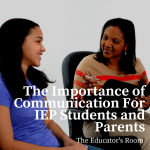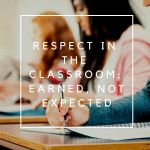I have taught under four principals in my short career, and unfortunately, none of them has inspired me to be a better educator. Tragically, all but one have contributed to my loss of faith in our current education system. When I pursued this career, I imagined my administrators to be like the Hall Directors at my college- coaches. During my Residential Advisor years, my Hall Directors monitored the building staff and residents, but they only intervened when needed. They helped brainstorm ideas for programs and gave feedback, but at no point did they tell me how to run my programming; they discussed and debriefed resident concerns, but at no point did they assume that they knew my residents better than I did. They empowered us to do our jobs. I assumed that the principal-teacher relationship would mirror the teacher-student relationship; principals would pour into me to enhance my abilities so that I could best serve my students. However, being in the system for five years and hearing countless stories from other teachers, I doubt the existence of such an inspirational administrator. Am I too idealistic or has the system corrupted the role of the principal? After conversing with several teachers across the world, I’ve discovered one consistency: a disconnect between principal and teacher. Just as teachers need to wear the students’ shoes, principals should consider the teachers’ perspectives. After all, we are on the front lines.
[fusion_builder_container hundred_percent=”yes” overflow=”visible”][fusion_builder_row][fusion_builder_column type=”1_1″ background_position=”left top” background_color=”” border_size=”” border_color=”” border_style=”solid” spacing=”yes” background_image=”” background_repeat=”no-repeat” padding=”” margin_top=”0px” margin_bottom=”0px” class=”” id=”” animation_type=”” animation_speed=”0.3″ animation_direction=”left” hide_on_mobile=”no” center_content=”no” min_height=”none”][bctt tweet=”Am I too idealistic or has the system corrupted the role of the principal?” username=”EducatorsRoom”]
Am I too idealistic or has the system corrupted the role of the principal? After conversing with several teachers across the world, I’ve discovered one consistency: a disconnect between principal and teacher. Just as teachers need to wear the students’ shoes, principals should consider the teachers’ perspectives. After all, we are on the front lines.
Since I have never been an administrator, I know that I am not entitled to tell you how to do your job. Below is a list of ineffective behaviors that I have observed during principal-teacher interactions. Maybe considering the situation from a teacher’s point of view will help you develop a compromise.
Jumping to Conclusions: When you walk past a classroom and poke your head in or when you walk into a room for observation (whether it’s for a few minutes or the entire period), keep in my mind that you don’t know the context of the lesson. Where is the activity within the lesson? Where is the lesson within the entire unit? Think of it this way: Can you accurately judge a two-hour movie after watching a few minutes or a single scene? With the limited viewing, can you infer what happens in the rest of the movie? Even if you are an avid movie-watcher and can recognize patterns, the reality is that you are guessing by filling in gaps based on your assumptions. Similarly, you are attempting to evaluate a snap shot of the classroom with limited information. You either need to have context before you enter the classroom or you must be open to explanation after the observation. At one of my schools, I was required to prepare a multiple-page document for my scheduled observation. I spent hours detailing my plan, explaining how the activity fit into the entire unit, discussing outcomes, and analyzing standards. During the observation and post-observation meeting, the principal asked me several questions that were covered in my pre-observation paperwork, but when I asked if she had read the document, she said she hadn’t. With the context of the lesson, she would have walked into the room with a different pair of goggles on. Be humble enough to know that your assumptions aren’t always correct.
Dominating Reflection Conversations: When I hold writing conferences with my students, I make certain that they are engaged by encouraging them to talk more than me. They read their work aloud; they explain the writing process; they answer my questions; they discuss revisions. If I told a student how to change his essay with no conversation, it’s no longer his work, and he won’t understand how to write a better essay next time. Similarly, if you dictate how to run the classroom without including the teacher in the conversation, then it’s no longer the teacher’s room. Furthermore, by decreeing protocols, how have you taught your teachers how to be better educators? With one principal, almost all of my meetings centered on her voice; I rarely spoke because she rarely gave me the opportunity. She expected me to blindly follow her directions without discussion. This tactic will never empower teachers and students.
Listening to Gossip: The teacher lounge can be a war zone. We are surrounded by children all day, and sometimes, we start adopting their behaviors, specifically speaking without thinking. I have intruded on several personal conversations, and I had to train myself to ignore them (without context, I could never fully understand the words). Using teacher-lounge conversations as evidence to your claims is foolish. The room is not a workspace; it is a break-from-work space. Therefore, the conversations aren’t professional and shouldn’t be treated as such. Allowing gossip to be the foundation of your beliefs makes for a poorly structured building. One of my principals would address her concerns by claiming they were gossip: “I heard that you said this…” This tactic only fuels distrust amongst colleagues and administrators.
Requiring a laundry list of unnecessary items: I appreciate the tug-of-war game that is your job; you have multiple masters to serve (central office, state officials, taxpayers, parents, students, teachers, etc). However, remember that anyone working in an educational setting faces the pull as well. Your supervisors expect paper evidence, but does that excuse overburdening your teachers? The more paperwork you require, the less time we have to focus on our students. For five years, I have written cryptic “lesson plans” based on a variety of formats to please administrators. One principal required us to post the week’s plans online for parents to follow. Ha! I could hardly decode my colleagues’ plans, so how could a parent possibly understand the document? None of my principals gave the teachers any specific feedback, so some teachers stopped writing plans. Shockingly, no one noticed. So what was the point? I have handed paperwork to principals and watched them immediately throw it into a box. Be intentional with your required paperwork. I never give my students meaningless work, and I expect the same courtesy from my supervisors. If you do need a document, articulate your purpose. We’ll grumble less.
Discussing Position Placement During the School Day: One of my schools needed to let go of teachers due to budget cuts. “We want to keep you, but there isn’t enough money”: a hard pill to swallow. That principal decided to inform teachers about their statuses during the school day; she pulled teachers from their classrooms, told them that they didn’t have spots for the following year, and asked if they could return to their classes for the rest of the day or if substitutes were needed. She did this on a student early-release day when professional development occurred in the afternoon. The following week, students protested with a day of silence (they even petitioned outside while it was snowing). They didn’t demand more money; they wanted more respect. Another principal held post-observation meetings before and during school. I watched teachers return to classes in tears. Imagine being told that you are so awful that you may no longer have a job, and then you need to teach for the rest of the day. How does this tactic benefit anyone? It’s a power play. Remember your teachers (even the struggling ones) are humans and deserve your respect. Teaching is emotionally draining, so please don’t make it more difficult than it already is.
My high school teachers suggested this profession for me because they saw a passionate leader. As a young teacher, I have been offered more leadership roles than some experienced teachers have. Several colleagues have asked about my future goals, and I always dismiss becoming an administrator. I have watched too many administrators forget what it is like to be a teacher; I have witnessed too many administrators disregard their teachers in favor of another administrator. All I’m asking of you is to remember your teachers.
 [/fusion_builder_column][/fusion_builder_row][/fusion_builder_container]
[/fusion_builder_column][/fusion_builder_row][/fusion_builder_container]






